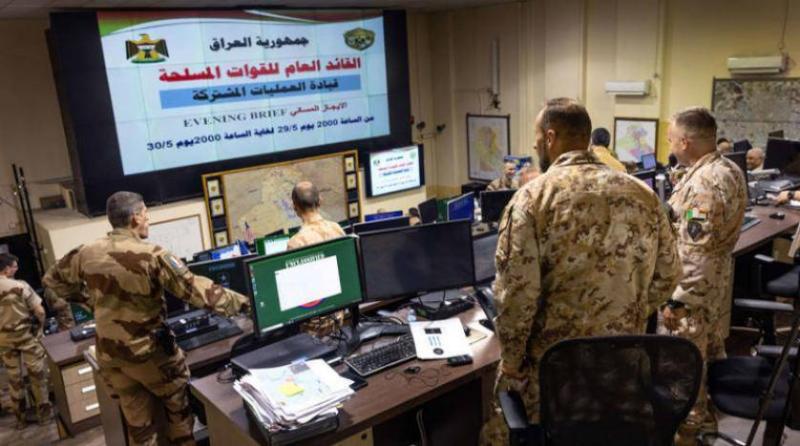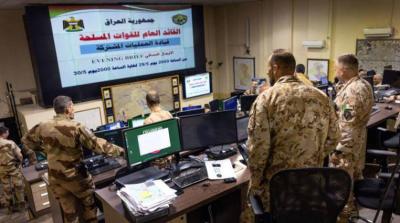The Iraqi Joint Operations Command announced that Iraq and the United States held their first technical meeting between the military leaderships of both countries to discuss the plan for the redeployment of coalition forces outside Iraq. A statement from the command indicated that the first meeting between the Iraqi technical military committee, led by Deputy Commander of Joint Operations Lieutenant General Abdul Amir al-Shammari, and the American counterpart, led by the Commander of Operation Inherent Resolve in Iraq, General Paul Calvert, took place as part of the security technical discussions agreed upon in the strategic dialogue session held on April 7.
The statement added that "the American side reaffirmed its respect for Iraq's sovereignty, clarifying that the international coalition led by the United States is present in Iraq at the request of the Iraqi government to provide advice, support, and enable the complete defeat of the terrorist (ISIS) gangs." It clarified that the two sides agreed on "a framework for upcoming sessions to discuss the long-term security relationship between two fully sovereign states." They also agreed on "a plan of action to implement the outcomes of the strategic dialogue between Iraq and the United States, which is to be finalized during the next talks scheduled to be held in Baghdad or Washington in July or August 2021, and will include specific mechanisms and timelines to complete the redeployment of coalition combat forces outside Iraq."
Regarding the outcomes of this dialogue, strategic expert Ma'an al-Jubouri told Asharq Al-Awsat that "the success of previous rounds between the two parties led to the continuation of this strategic dialogue between Iraq and the United States, where the Iraqi negotiators managed to achieve positive results in previous rounds, which represented a problem for both previous and current governments due to the pressures exerted by political forces to achieve a single goal, which is the withdrawal of American forces from Iraq." Al-Jubouri added that "this matter posed a dilemma for the Iraqi government as the methods employed by political forces, whether militias or armed factions, especially those close to Iran, represent a significant issue for Iraqi diplomacy and the Iraqi government, as it gives the impression to others that the Iraqi government is unable to curb these forces on one hand, and provides a negative indicator that the security situation is unstable and not under control, in addition to the other negative impacts, especially on the economy, as Iraq has turned into an environment repelling for investment."
Al-Jubouri explained that "based on these factors, technical negotiations between the two military leaderships began, representing the fourth round of Iraqi-American dialogue, which also occurs under the administration of President Joe Biden, which may have the flexibility and willingness to understand the reality in Iraq and appreciate the position of the Iraqi government, especially with America and Iran engaged in negotiations in Vienna over the nuclear file and what leverage Iran can exploit in this context."
Al-Jubouri noted, "It is hoped that this round will yield more solid and clear results, as previous rounds have paved the way for this one, which in itself is an indicator of success. It is expected that there will be outcomes that primarily benefit the Iraqi government, and the American understanding has become clear now regarding the pressures the Iraqi government is under." He emphasized that "all indications on the ground confirm that Iraq is entering a new phase in its agreement with the United States, including the redeployment of those forces and reducing the number of fighters present in Iraq, as this presence will remain within the framework of advisory, logistical, intelligence support, and air force experts only."




